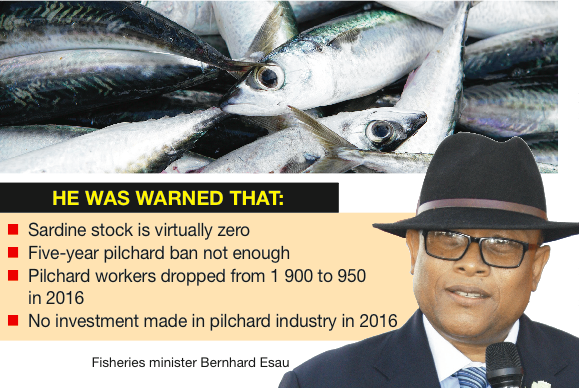By Shinovene Immanuel | 10 February 2017
FISHERIES minister Bernhard Esau has ignored advice from scientists and his officials and is pushing ahead with the allocation of pilchard quotas, a species declared as “depleted” and in danger of extinction from Namibian waters.
The Namibian understands that Esau has already gone to Cabinet to rubber-stamp his decision to exploit the sardines, going as far as hiding some of the most critical warnings from experts and from political colleagues.
Esau denied allegations that he is ignoring recommendations from his scientists, and said that he is not pushing for the interests of pilchard companies.
In his request to Cabinet, Esau has reportedly underplayed scientific research showing that pilchard has been overfished for the past several years, and that it may not recover again, even if a ban of five years was put in place.
Pilchard fishing has been the most lucrative species in the industry, generating a lot of cash for those Esau and former fishing ministers gave fishing rights to. Pilchard is a well-known fish species in Namibian households, and is famously distributed in cans under well-known brands such as Lucky Star.
Insiders in the fisheries ministry told The Namibian this week that Esau wants Cabinet to approve the fishing of pilchards, despite warnings from scientists in his ministry.
“The sardine stock size is currently estimated at virtually zero level, and the natural mortality is considered to be very high, while recruitment has been poor for five consecutive years,” said an insider, stating that they have used the same wording to warn the minister, but feared the warnings were being ignored.
According to the source, the pilchard companies have struggled to fulfil their allocated total allowable catch over the past few years, even when their catching period was extended by the ministry, a sign of a depleted resource in Namibian waters.
Every year or fishing season, the minister of fisheries seeks permission from Cabinet to declare a “total allowable catch”, which refers to a limit set by government on how much fish will be caught during a season.
Fisheries ministry insiders said Esau wants to propose that 14 000 metric tonnes of pilchard be harvested for the 2017 fishing season. His motives, sources said, are driven mainly by pressure from people who are lobbying him to make as much cash in the shortest time as possible.
This is despite evidence that 2016 fishing targets were not met because of the declining stock in the sea.
Last year, Cabinet, on the recommendations of Esau, approved the harvesting of 10 000 metric tonnes, but the companies only managed to catch 3 400 metric tonnes (34%) of that target.
Officials said fishing companies stopped their pursuit of pilchards because they were losing money in the hopeless search for the fish.
According to a report in The Namibian in 2006, concerns about the stock of pilchards started as far back as in the mid-1990s. That news report said the total allowable catch was reduced from 125 000 metric tonnes in 1994 to 40 000 metric tonnes in 1995, and reduced again by 20 000 metric tonnes in 1996. Now, statistics show that fishing companies struggle to land 3 000 metric tonnes per year.
Experts said concern over the possible extinction of pilchard is so deep because no recovery will be achieved if strict measures are not enforced.
In fact, scientists said, a five-year ban on pilchard fishing in Namibia will not be enough to recover its stock, even though it will minimise fishing pressure on the species.
Experts also warned that no sardine spawn was found between March and April last year.
A source said this is an indication of a “very low sardine adult stock”.
As the third-largest employer in the fishing sector with 10%, workers in the pilchard industry have dropped from 1 900 to 950, which represents a decline of around 50% from 2015 to 2016.
The Namibian has learnt that no investment was made into the pilchard industry in 2016, and the socio-economic contribution decreased from N$1,7 million in 2015 to N$245 000.
Some Cabinet members, known to own fishing companies or with links to fishing business associates, are said to be pushing for the maximum exploitation of fish stock.
Sources said Esau, supported by a few Cabinet colleagues such as attorney general Sacky Shanghala, wants to justify and convince Cabinet to approve the fishing of pilchards by saying that the absence of pilchard fishing will reduce economic benefits, such as a negative impact on Namibian pilchard right holders who do not own vessels and factories.
According to people familiar with how he has sidelined scientific research, Esau is using the threat of job losses to cover up the fact that his main reason is to help those who want to make a quick buck from the industry.
The fisheries ministry is accused of double standards by being strongly against phosphate mining, which it says might negatively affect fishing stock, while at the same time depleting species, including pilchards.
I WAS TOLD…
Esau told The Namibian yesterday that claims that he is ignoring his scientists are not true because he decided to recommend 14 000 metric tonnes for this year via recommendations by the Marine Resource Advisory Council made up of scientists, trade unions and other officials.
“I acted on the advice of the advisory council,” he said.
Esau claims that he wanted to temporarily ban the fishing of pilchards, but the advisory council told him not to.
He said 4 000 metric tonnes of the 14 000 metric tonnes will go to researching the pilchard industry offshore, while 10 000 metric tonnes is for right holders.
The minister added that the industry had informed him that pilchards have gone into deeper waters, making it difficult for fishing companies to catch beyond the limits set by government. Unlike other fishing companies in species such as horse mackerel (maasbanker) which use trawlers, pilchard companies use nets that do not go into deep waters.
Esau also denied allegations that he is protecting the interest of associates and business people.
The attorney general has been Esau’s supporter in Cabinet on many occasions.
“It is not about Shanghala supporting Esau,” Shanghala said, adding that Esau is guided by the Constitution when allocating marine resources.
In this case, Esau made a decision based on advice from the advisory council, which was guided by scientific factors.
BLAME THE SEALS
One of the companies which has harvested pilchards since the 1940s is Etosha Fishing, a Namibian-registered company that also produces Lucky Star pilchards for the Namibian market.
Etosha Fishing is 45% owned by South African company Oceana Group (the owner of Lucky Star), while 30% is owned by the Government Institutions Pension Fund.
Four Namibian rights holders own a combined 20% stake (5% each), while the remaining 5% is owned by local business people.
Etosha Fishing’s managing director, Pieter Greeff, said “we know pilchard has been under pressure”.
He, however, said the idea of banning the fishing of pilchards is not the solution because the sector will not recover. Greeff claimed that Etosha Fishing employs 650 people for the fishing season.
He said pilchard catchers failed to catch the quotas last year because the pilchards are migrating into deeper waters, which is difficult to assess, unlike in the past when they were closer to land.
Greeff said besides the migration, seals are also consuming more fish than what companies are catching per year.
“Seals are going to eat the fish anyway. Seals are eating pilchards more than what the entire fishing industry is catching,” he stated.
*This story was produced by The Namibian’s investigative unit. Send us story tips via your secure email to: investigations@namibian.com.na






